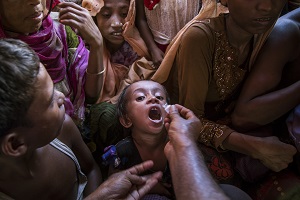World’s second largest oral cholera vaccination campaign kicks off at Rohingya camps in Bangladesh
Joint press release from World Health Organization and UNICEF
A massive cholera immunization campaign started near Cox’s Bazar, Bangladesh, to protect newly arrived Rohingya and host communities from the life-threatening diarrheal disease on Oct 10. 900 000 doses of the vaccine have been mobilized and are being delivered by more than 200 mobile vaccination teams, making it the second largest oral cholera vaccination campaign ever.

A child receives an oral cholera vaccination as part of a cholera immunization campaign near Cox’s Bazar, Bangladesh, to protect newly arrived Rohingya and host communities from the life-threatening diarrheal disease.
The campaign, which is led by the Ministry of Health and supported by the World Health Organization (WHO) and UNICEF, is being held in Ukhiya and Teknaf, where more than half a million people have arrived from across the border since August, joining vast numbers already residing in a series of settlements and camps.
The first round of the campaign will cover 650,000 people aged one year and older. The second round will commence on 31 October and will target 250,000 children between one and five years with an additional dose of the vaccine for added protection.
“This is the second largest oral vaccination campaign in the world after Haiti in 2016,” says Edouard Beigbeder, UNICEF Representative in Bangladesh. “Cholera is a dangerous disease, especially among children living in cramped, unhygienic conditions. Prevention is essential.”
In the last week, at least 10,292 cases of diarrhoea have been reported and treated from across the settlements and camps. WHO has warned of the potential for an outbreak of cholera.
UNICEF and WHO are supporting the Ministry of Health with planning, distribution, volunteer orientation, operational costs and monitoring.
“Emergency vaccination saves lives. The risk of cholera is clear and present, and the need for decisive action apparent,” says Dr. N Paranietharan, WHO Representative to Bangladesh. “WHO is committed to mobilizing its full technical and operational capacity to support the Ministry and our partners to protect, promote and secure the health of this immensely vulnerable population.”
In Ukhiya 150 teams have been deployed to vaccinate the target population, while 55 teams have been deployed in Teknaf. Each team is comprised of five members.
Though vaccination can provide life-saving protection against cholera, it supplements but does not replace other traditional cholera control measures such as access to clean water, adequate sanitation and good hygiene.
To help meet present water, sanitation and hygiene needs, UNICEF is working to scale up its interventions and communication on safe practices, and is prepositioning critical supplies for case management. WHO is monitoring water quality and working with the Department of Public Health Engineering to increase local laboratory capacity, has raised an early warning, alert and response emergency surveillance system, and has prepositioned life-saving supplies to ensure a rapid response if and when an outbreak occurs. In addition, the WHO-led Health Sector has supported the Ministry set up diarrhea treatment centres among other response-oriented interventions.
Source:United Nations Children's Fund
- 286 reads
Human Rights
Ringing FOWPAL’s Peace Bell for the World:Nobel Peace Prize Laureates’ Visions and Actions

Protecting the World’s Cultural Diversity for a Sustainable Future

The Peace Bell Resonates at the 27th Eurasian Economic Summit

Declaration of World Day of the Power of Hope Endorsed by People in 158 Nations

Puppet Show I International Friendship Day 2020

